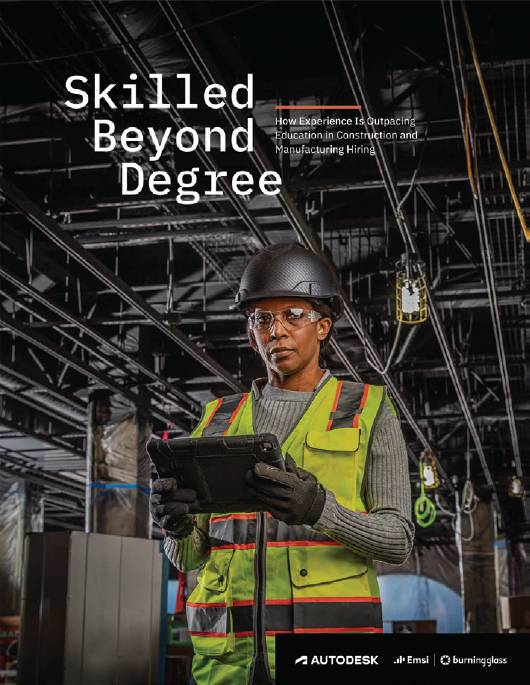Why experience is outpacing education as a hiring priority
Jaime Perkins, Director, Learning Strategy, Curriculum Design and Certification, Autodesk, with Rachel Sederberg, Senior Economist, Emsi Burning Glass

AS we enter a new year, the UK continues to battle mass pandemic disruptions to boost economic recovery. All eyes are on what’s been termed ‘the Great Resignation’, a trend that began in 2021 with nearly one in four UK workers planning to change jobs.1
Many workers, both the underemployed and those waiting to return to work, are looking for better, safer, and higher paying jobs.
The Times’ annual economic survey2 is optimistic that unemployment is expected to remain near historic lows this year, which shows that we’re still in an employee market as industries compete to attract and retain talent. Companies in the manufacturing and construction industries are urgently seeking more employees with skills that align with roles that are rapidly changing due to automation, and as such, hiring priorities are changing too.
Over the last two years, the disruption caused by the emergence of new technology in the workplace has come into sharper focus.
Businesses have digitally transformed at an unprecedented rate during the COVID-19 pandemic. This transformation has made the reskilling and upskilling of workers even more important to ensure they can thrive as the workplace changes around them.
At Autodesk, we wanted to better understand how these changes have impacted the jobs landscape within specific industries so we commissioned a Future of Work report by Emsi Burning Glass.
‘Skilled Beyond Degree: How Experience is Outpacing Education in Construction and Manufacturing Hiring’ is a study of the jobs, skills and education that are most in demand in the construction and manufacturing industries.
With an eye toward the workplaces of both today and tomorrow, the report looked at job postings in the United Kingdom, United States, and Germany and found three key takeaways that will impact hiring priorities moving forward.
Takeaway #1 – Continuous learning is key

The research revealed a shift away from jobs requiring an undergraduate degree to jobs with no explicit education requirement.
These findings place more emphasis on skills and experience when it comes to matching qualified talent with new roles.
For many roles in construction and manufacturing, hiring managers are looking for candidates who can prove mastery in specific skills.In 2020, 82% of job postings in construction and manufacturing didn’t require formal education in the UK.
The speed with which the workplace is evolving to include new technologies, workflows, and processes means job qualifications and the ways we learn must also adapt.
For many roles in construction and manufacturing, hiring managers are looking for candidates who can prove mastery in specific skills.
And as these industries evolve, continuous learning through credentialing and certification programmes and on-the-job training will remain paramount for showing job-readiness and future-proofing CVs.
This report shows that training future workers, upskilling current workers, and identifying how skills can bring stability to those at risk of disruption from new technologies offers a trifecta of opportunities for those in construction and manufacturing.
All three of the geographies highlighted the rising importance of skills, suggesting businesses are beginning to recognise that experience and competency are more critical than a formal education when it comes to finding the right talent to carry their business forward.
Takeaway #2 – The impact of automation
The automation of tasks in the workplace has been one widespread byproduct of the digital transformation businesses are going through. As technology evolves and industries transform, we can expect both new job creation and the adaptation of current roles.
Training future workers, upskilling current workers, and identifying how skills can bring stability to those at risk of disruption from new technologies offers a trifecta of opportunities.Automation benefits employees by making their jobs safer and less mundane, but the introduction of new technology in the workplace has historically caused concern about job displacement.
The research pointed to the fact that workers can leverage the skills they already possess to pivot to new roles that are both lucrative – and less susceptible to automation – through informal skills development and education initiatives.
Someone who is at high risk of some or all of their job being automated is a quality inspector or technician.
These workers can leverage their existing skills to transition to a production supervisor role by learning only a handful of new skills. This metamorphosis will both insulate them from the risk of automation and increase their salary.
Takeaway #3 – Skills and roles on the rise
The research also showed trends for the types of roles and specific skills that will be coveted most in the near future.
Additional findings include:
- Despite the shift away from degree qualifications, there remains a demand for sophisticated technical and nontechnical skills. Data and management skills featured prominently in job postings, indicating that construction and manufacturing continue to face complex challenges that they are looking to qualified talent to solve.
- Logistics and supply chain management were brought to the forefront of public awareness during the global COVID-19 pandemic, and their importance is projected to continue in years to come.
- Renewable energy-related roles in manufacturing are some of those poised for the greatest growth in the next five years, emphasising the need for adaptation to new methods and new technology.
As roles, disciplines, and industries converge, selecting a specific field of study or a degree is less important than committing to a lifelong-learner mindset. Employees prosper by adopting a mindset of continuous learning, acquiring the most in-demand skills, and securing the most fulfilling roles. In a competitive market, employers have a responsibility to provide these fulfilling roles, or talent will simply move elsewhere.
Jaime Perkins, Director, Learning Strategy, Curriculum Design and Certification, Autodesk, with Rachel Sederberg, Senior Economist, Emsi Burning Glass
The full report is available at https://adsknews.autodesk.com/news/skills-report
2 www.thetimes.co.uk/article/inflation-will-rise-but-little-to-fear-for-uks-jobs-marketsms 7f7m7q
